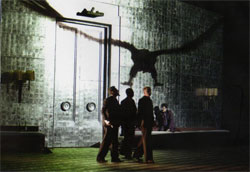| An almost perfect combination of pure singing and fine acting |
Welsh National Opera |
| Welsh National Opera- The Return of Ulysses , Wales Millennium Centre , September 18, 2006 |
 With Monteverdi, considered one of the most powerful figures in the history of music, we are back almost at the beginning of Opera. Back at the latter half of the Sixteenth century and Renaissance Rome where the theatre the Romans had taken over from the Greeks had existed since ancient times, from Gladiatorial combat to pre-renaissance Commedia Dell'arte. The antique texts of Greek dramas indicated that music was often used during performances. About this time an experimental theatre movement began to grow in Florence, the plays were read aloud with a few musical chords being added for accompaniment. By 1640 Claudio Monteverdi had perfected this new form with the addition of arias allowing for the expression of emotion and character in song. In this year his opera was first performed at Teatro San Cassiano in Venice.
With Monteverdi, considered one of the most powerful figures in the history of music, we are back almost at the beginning of Opera. Back at the latter half of the Sixteenth century and Renaissance Rome where the theatre the Romans had taken over from the Greeks had existed since ancient times, from Gladiatorial combat to pre-renaissance Commedia Dell'arte. The antique texts of Greek dramas indicated that music was often used during performances. About this time an experimental theatre movement began to grow in Florence, the plays were read aloud with a few musical chords being added for accompaniment. By 1640 Claudio Monteverdi had perfected this new form with the addition of arias allowing for the expression of emotion and character in song. In this year his opera was first performed at Teatro San Cassiano in Venice.The original score of Monteverdi’s sublime and beguiling music exists only in a somewhat basic form. Over the years it has been ‘edited’ and ‘translated’ many times. This co-production with The Royal Dutch Theatre brings the wonderful, world expert of the music of Monteverdi, Rinaldo Alessandrini’s most aesthetic and sensitive embellishments to the score which he conducts, a very responsive WNO orchestra, with the most assured creative skill. Whilst this is very much an ensemble piece, skilfully staged by David Alden, with an exciting design by Ian MacNeil, cleverly lit by Simon Mills each character has an opportunity to sing and communicate directly with the audience. Sara Fulgoni, with a voice both noble and sensual, starts her opening aria way, way at the back of the theatre’s deep stage against the silvery metallic grey walls of her palace. She moves right down to the front of the stage, almost leaning over us to maximise our sympathy with her great longing for her husband to return. All under the steady hand and watchful eye of Elizabeth Vaughan’s Ericlea, her old nurse. We were able to experience here, as with all this energetic cast that almost perfect combination of pure singing and fine acting, that is the essence of all great opera performances. The passion, the avarice and the background of war (Trojan) that lie at the core of this story tells us that civilisation has progressed very little since the time that Homer created this great myth 800 hundred years before the birth of Christ. It engages us in this very traditional/twenty first century style production both in the tightly focussed telling of the story, at all times so beautifully underpinned by the unique music and the vivid characterisation of the player/singers There is no overture, within a few bars all human frailty is revealed to us, personified by the extraordinary counter-tenor of Iestyn Davies setting up the comedy line that keeps popping in and out of the drama. He reappears as a redheaded suitor, along with equally animated performances from Clive Bayley and Andrew Mackenzie-Wicks representing Penelope’s 100+ suitors. Neptune’s appearance in wet suit and enormous flippers in no way detracts Clive Bayley from giving us a lyrical and robust rendering of the role. The sexual banter between Sarah Tynan’s Melatno and Andrew Tortise’s Eurimaco as they coquetteishly tease each other and try to persuade Penelope to give in to her suitors is great fun and again with well pitched singing. Paul Nilon’s Ulysses has all the romance of an operatic hero and the climax of his final reconciliation with Penelope is given a captivating choreography by Claire Glaskin that has been another stylish addition to the production. Each member of the cast deserves to be mentioned as does Ulysses’ bow of fire which only just managed to pass the health and safety regulations. This was an opera written before the introduction of a lavish chorus. Each scene whether solo, duet or quartet etc. was placed before us like a delicious mouth-watering delight in a seven-course meal and although each course was excellent in itself the whole dinner was not quite totally satisfying, not for those of us who had dined at the tables of Wozzeck and Mazepa, they were particularly privileged gastronomic and extraordinary aesthetic experiences but provided by the same chef. |
Reviewed by: Michael Kelligan |
This review has been read 1536 times There are 111 other reviews of productions with this title in our database:
|
